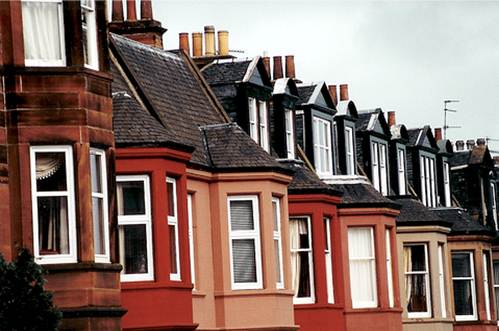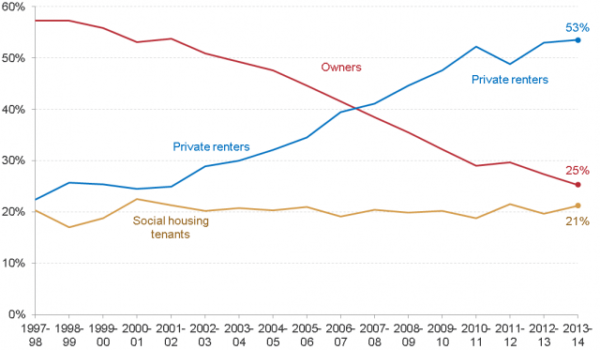

Economy
Owning a Home Set to Become a Pipe Dream for Young Workers on Modest Incomes
Owning a home set to become a pipe dream for young workers on modest incomes. Over-45s now account for three-quarters of all home owners. The housing ladder is disappearing for most young working households on modest incomes. For this group home ownership is projected to be approaching just one-in-ten by 2025, according to new analysis to be published next week by the independent Resolution Foundation think tank.
While the biggest decline in young families owning homes is for those on modest incomes, it has also fallen for young households that are benefit dependent or on higher incomes. As a result home ownership is increasingly becoming the preserve of older and wealthier households.
The analysis finds that those aged 65+ now account for around one-third (32 per cent) of all homeowners, up from less than one-quarter (23 per cent) in 1998 – an increase of 43 per cent. In contrast, those aged 16-34 account for just 10 per cent of homeowners, down from 19 per cent in 1998 – a 49 per cent reduction.
The analysis shows that young (under-35) modest income working households (working-age households in the bottom half of the income distribution who are primarily in work) have recorded especially sharp declines, with homeownership plummeting from 57 per cent in 1998 to just 25 per cent. In contrast, levels of private renting have more than doubled, from 22 per cent to 53 per cent.
The position is starker still in London. The proportion of younger modest income working households owning their own home more than halved over the last decade, falling to just 13 per cent. If home ownership were to continue to decline at the same rate in the capital for this group, it would all but end by 2025, dropping below 1-in-20.
Younger modest income households in the capital are already more likely to live in social housing (17 per cent) than in their own place. But the predominant position is to rent privately, with 70 per cent of members of this group doing so – up from just 37 per cent in 2003.
Looking across low to middle income households of all ages, the research shows that just over half (55 per cent) own their home, one-quarter (27 per cent) rent privately and one-fifth (19 per cent) are in socially rented accommodation.
Nationally, homeownership has been falling slowly since the start of the century – following a steady increase from the 1950s onwards – and stands at around 63 per cent today.
Matt Whittaker, Chief Economist at the Resolution Foundation, said:
“Our findings highlight the extent to which the housing landscape facing young, working households on modest incomes has shifted in recent years. At the turn of the century, just over half of this group owned their own place; today it’s one-quarter. If that pace of decline continues, we can expect home ownership to be available to fewer than one-in-ten by the end of the next decade.
“With the average modest income household having to spend 22 years to raise the money needed for a typical first time buyer deposit – up from just 3 years in the mid-1990s – it’s no surprise that owning is increasingly a pipe dream for many.
“If we want to see an increase in working families being able to afford to buy, it is essential that the housing shortage is tackled by the Government. Schemes such as Help to Buy can only ever help a minority – often providing a leg-up to those who would eventually climb onto the housing ladder anyway. More than half of those benefiting from Help to Buy to date have household incomes in excess of £40,000. It is hard to imagine any way out of the home ownership crisis facing those on low to middle incomes that doesn’t involve significantly boosting house building.”
Change in tenure among low to middle income households aged under-35:
UK 1997-98 2013-14



 Environment12 months ago
Environment12 months agoAre Polymer Banknotes: an Eco-Friendly Trend or a Groundswell?

 Features11 months ago
Features11 months agoEco-Friendly Cryptocurrencies: Sustainable Investment Choices

 Features12 months ago
Features12 months agoEco-Friendly Crypto Traders Must Find the Right Exchange

 Energy11 months ago
Energy11 months agoThe Growing Role of Solar Panels in Ireland’s Energy Future





























